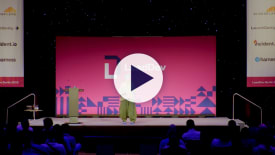
Latest videos
-

Journeys in diversity – what difference really means
Discover what true inclusion means by exploring practical ways to support neurodivergent colleagues and create genuinely diverse teams.
-
 In partnership with Antithesis
In partnership with AntithesisBuild bravely: Delivering risky projects
Learn how clear specifications and property-based testing help engineers take bolder roadmap risks, ship faster, and collaborate safely with LLMs.
-

Lessons from the other side: What your VP is actually thinking
Learn how to build a partnership with your VP by sharing unfiltered reality and gaining the context you need.
-
 In partnership with Cloudflare
In partnership with CloudflareHow to prioritize when modernizing legacy systems
The path to app modernization isn’t about fixing everything at once – it’s about fixing what matters most.
-
 In partnership with Harness
In partnership with HarnessDatabase changes slowing you down? There’s a better way
Is it time to bring database administrators into the DevOps circle?
-
 In partnership with
In partnership withAre you ready for the next generation of incidents?
Incident response was never easy. AI is about to make it harder.
-

How to get buy-in when you’re not the boss
Practical strategies for influencing without authority in cross-functional teams
Highlights from our conferences

Measure for Change
Picking metrics is one thing. But the harder decisions lie in what to do with them afterward.
View all videos from LeadDev London

Drive product gaps as an engineering leader
Discover practical strategies for engineering leaders to influence product development effectively, even in the absence of strong product management and a clear company vision.
view all videos from LeadDev NEW YORK

Growth in a downturn
In this talk, Smruti Patel asks, if hyper-growth is marked by spending more to make more, what does building for enduring growth look like?
view all videos from LeadDev berlin

Idea to Innovation
Join me as we embark on a journey to dissect the anatomy of innovation, uncover strategies to unlock the full potential of ideas, and transform them into impactful realities. Let’s build a strong culture of innovation, and make sure that it is not just a buzzword but a tangible outcome.
view all videos from staffplus london

Slack enterprise key management: Senior to staff lessons
Explore the key lessons and skills Audrei gained during their first Staff+ project, Slack Enterprise Key Management. This talk offers insights for anyone growing in their Staff+ career.
view all videos from staffplus NEW YORK
All videos
-

Feedback: Vital for growth, tough to crack
Hena shares how Feedback combined with coaching can be a very powerful leadership technique that helps your teammates elevate to their next level at LeadDev Together.
-

Designing an engineering career framework
Anirudh Todi introduces the approach taken when designing and iterating on our engineering career framework at Dropbox.
-

Culture change in a hostile environment
Jason Wong discusses strategies and tactics for seeding cultural change, creating environments for that change to grow, and what are the limits to those changes at LeadDev Together.
-

Hiring for culture add, not culture fit
Emily will share lessons learned from four years of evolving hiring practices at Honeycomb at LeadDev Together.
-

Creating a culture of trust
Dana Lawson explores how to quickly build cultures of trust on engineering teams, outlining the benefits and giving practical advice at LeadDev Together.
-

Utilizing the tools in your toolbox for onboarding and retention
Onboarding and retention are critical and yet many of us either aren’t spending enough time or the right kind of time to onboard and retain effectively.
-

Onboarding: setting the foundation for growth
Cate Huston talks about onboarding for retention through the dual lenses of belonging and accomplishment at LeadDev Together.
-

Breaking down knowledge silos between engineering teams
How can we restructure the silos that are slowing us down?
-
Collaborative debugging on engineering teams
Teams that write code together should be able to debug issues together. But while we think a lot about engineering collaboratively, we rarely develop processes for debugging collaboratively.
-
In partnership with Honeycomb
Observability with actionable insights
You may have heard the hype; now see it in action. With Honeycomb, modern dev teams build and operate resilient, reliable systems because they can clearly understand them.
-
In partnership with Moogsoft
Turning observability data into action
Reduce noise, conquer alert fatigue, and deliver a seamless customer experience with Moogsoft.
-
In partnership with Marco Polo Network
Building a scalable, automated network management system for thousands of independent nodes
The Marco Polo Network is the largest trade finance network in the world. The network spans 60+ regions and 140 countries in the Microsoft Azure cloud.
-
In partnership with Instana
Instana’s approach to observability
This demo will cover Instana’s observability platform and automated Application Performance Monitoring (APM) solution, designed specifically for the challenges of managing microservice and cloud-native applications.
-
In partnership with CircleCI
Growing your team’s superpowers with CI/CD
In this talk we’ll cover the Whys, the Whats, and the Hows of setting up a CI/CD pipeline and making it work for us as we strive to ship better software, faster.
-

Building security into your engineering workflow
You don’t need to sacrifice delivery times when building a secure product
-

Addressing technical skills gaps in your engineering team
Identify and fill training gaps that slow you down.
-
In partnership with Codility
Codility – Where the best engineering teams are built
Looking to hire a word-class engineering team faster without wasting engineering or recruiting time?
-
In partnership with Rollbar
Introduction to Continuous Code Improvement
Join our solutions engineer to understand how we can help reduce deployment time and cost with an accuracy that you and your team can rely on.
-
In partnership with Just Eat Takeaway
Developing a courier app in a leading food-tech company
Join us for our demo where Mert Kilic, Senior Software Developer at our Berlin Tech Hub, will give an introduction to our new restaurant courier app which we launched in February this year.
-
In partnership with LinearB
Start your Engineering Metrics Program with LinearB
We’re going to show you the most important team-based metrics to track, how to identify workflow bottlenecks and proven tactics for improvement.
-

Decision Making for Software Engineering Teams: Francesco Strazzullo in conversation
How to be mindful on what data you need to decide on
-
Luminary Interview with Coraline Ada Ehmke
As you grow as a technical leader, identifying career paths and opportunities can be difficult and you can easily get stuck without knowing what it takes to get you to the next level.

